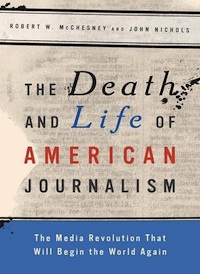Bad News for Good News

Besides the malcontents and know-nothings who are apt to bleat out various accusations about some media conspiracy (failing even to understand the distinction between media and journalism), for the most part it would appear that the only people who are concerned about the state of American journalism are malcontents and some pointy-headed intellectuals.
Personally, I am with the latter. Consider Eric Alterman’s homage to Bill Moyers upon his impending retirement:
He treated his audience as adult citizens of a republic, who bear collective responsibility for the society we share. The notion that television can both entertain and educate—even to the point where it challenges our most powerful ideas and institutions—was crucial to the medium’s founders. Yet it has all but disappeared in our current political culture, together with the democratic self-confidence necessary to sustain it.
Which suggests some of the symptoms that ravage what once was an honorable calling—perhaps before corporate octopi prioritized “monetizing” (what a déclassé word, no?) news, thus hastening the transition from vital and useful information to entertainment—the by-now clichéd “if it bleeds, it leads” approach. Additionally, the daily newspaper becomes an endangered species, coverage of vital areas of the government disappears, and foreign news bureaus are dispensed with. That’s bad news for good news.
Robert W. McChesney—a pointy-headed academic—and malcontent John Nichols have collaborated on The Death and Life of American Journalism: The Media Revolution That Will Begin the World Again (Nation Books). Of them and this book Moyers has asserted, “John Nichols and Bob McChesney are the Thomas Paine and Paul Revere of our time. We ignore them at democracy’s peril.”
Their thesis is simple: journalism is a necessary counterbalance the machinations of oligarchs, bureaucrats, and plundering plutocrats, and is essential to a functioning democracy. And Nichols and McChesney’s resolution is also simple: looking to the Founding Fathers’ interest in ensuring protection of a free press via the First Amendment (so revered we even capitalize it).
American academic and political activist Lawrence Lessig summarizes:
No one seriously denies the extraordinary threat that journalism in America faces today. Nor can anyone serious ignore this extraordinary account of its source and solution… McChesney and Nichols show us that the problem is not just the Internet. Nor is the solution just the Internet. Instead, the real answer to challenges that media face today is the same solution our Framers chose: public support for public media.
